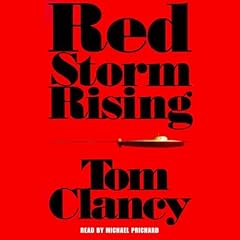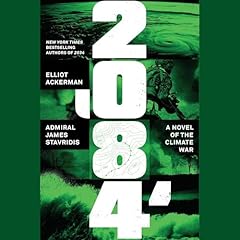
2034
A Novel of the Next World War
No se pudo agregar al carrito
Add to Cart failed.
Error al Agregar a Lista de Deseos.
Error al eliminar de la lista de deseos.
Error al añadir a tu biblioteca
Error al seguir el podcast
Error al dejar de seguir el podcast
 Exclusivo para miembros Prime: ¿Nuevo en Audible? Obtén 2 audiolibros gratis con tu prueba.
Exclusivo para miembros Prime: ¿Nuevo en Audible? Obtén 2 audiolibros gratis con tu prueba.Compra ahora por $18.00
-
Narrado por:
-
Emily Woo Zeller
-
P.J. Ochlan
-
Vikas Adam
-
Dion Graham
-
Feodor Chin
On March 12, 2034, US Navy Commodore Sarah Hunt is on the bridge of her flagship, the guided missile destroyer USS John Paul Jones, conducting a routine freedom of navigation patrol in the South China Sea when her ship detects an unflagged trawler in clear distress, smoke billowing from its bridge. On that same day, US Marine aviator Major Chris "Wedge" Mitchell is flying an F35E Lightning over the Strait of Hormuz, testing a new stealth technology as he flirts with Iranian airspace. By the end of that day, Wedge will be an Iranian prisoner, and Sarah Hunt's destroyer will lie at the bottom of the sea, sunk by the Chinese Navy. Iran and China have clearly coordinated their moves, which involve the use of powerful new forms of cyber weaponry that render US ships and planes defenseless. In a single day, America's faith in its military's strategic pre-eminence is in tatters. A new, terrifying era is at hand.
So begins a disturbingly plausible work of speculative fiction, co-authored by an award-winning novelist and decorated Marine veteran and the former commander of NATO, a legendary admiral who has spent much of his career strategically outmaneuvering America's most tenacious adversaries. Written with a powerful blend of geopolitical sophistication and human empathy, 2034 takes us inside the minds of a global cast of characters--Americans, Chinese, Iranians, Russians, Indians--as a series of arrogant miscalculations on all sides leads the world into an intensifying international storm. In the end, China and the United States will have paid a staggering cost, one that forever alters the global balance of power.
Everything in 2034 is an imaginative extrapolation from present-day facts on the ground combined with the authors' years working at the highest and most classified levels of national security. Sometimes it takes a brilliant work of fiction to illuminate the most dire of warnings: 2034 is all too close at hand, and this cautionary tale presents the reader a dark yet possible future that we must do all we can to avoid.
* This audiobook edition includes an exclusive interview with co-author Admiral James Stavridis.
Los oyentes también disfrutaron:




















Featured Article: Listen Like the World Is Ending with These Apocalyptic Audiobooks
Apocalyptic audiobooks all have one big thing in common: each is set in a world that is ending or just on the brink of collapse. Outside of that, apocalyptic and postapocalyptic stories take on all sorts of topics, twisting and turning into so many different genres and directions. Whether you love sci-fi adventures or prefer character-driven stories that reflect on real-world issues, this collection of listens has something for everyone.
Las personas que vieron esto también vieron:


















Viable scenario for the next world war
Se ha producido un error. Vuelve a intentarlo dentro de unos minutos.
The plot line has a tenable basis with some interesting tactical confrontations. Yet it is maudlin, over dramatic, repetitive and simplistic to an annoying degree. The strategic analysis and the aftermath denouement are tepid. As is the interview with the well decorated admiral as an epilogue.
Granted the admiral in both the novel and the wrap-up injects some well worn but generally welcome quotes, perspective asides and military philosophies. I strongly disagree with the author that fiction is required to find (and invent) interesting persons as protagonists for military/ historic narratives. As a USNA graduate with forty years as an officer he knows better than to say this. Great, gripping non-fiction abounds in libraries.
Alas, 2034 read like Clancy’s 1980s thriller “Red Storm Rising” without as much verisimilitude. I agree on its predicate enemy and theater of battle. As a futuristic Hail Mary pass ahead though, as a Cassandra notice it falls short of the end zone and is not a book of lasting merit.
Tom Clancy redux lite
Se ha producido un error. Vuelve a intentarlo dentro de unos minutos.
While dubious the plot could develop in reality. Take away the subtext and warnings.
in the end, a riveting listen.
Disturbing, thought provoking
Se ha producido un error. Vuelve a intentarlo dentro de unos minutos.
A Successful Book About A Failure Of Imagination
Se ha producido un error. Vuelve a intentarlo dentro de unos minutos.
As the authors say, this will “scare the h&@? out of to”
Se ha producido un error. Vuelve a intentarlo dentro de unos minutos.



